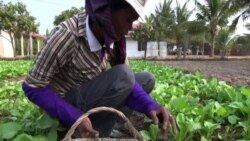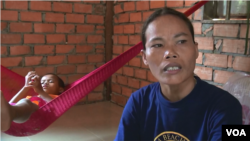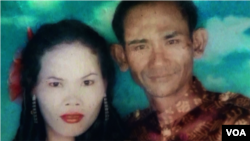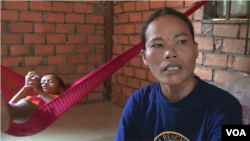Each morning as Uch Navy stands in front of the mirror, she glances at photos of her late husband and remembers the good times they shared.
One shows a young Cambodian couple dressed in finery, their faces close together, smiling.
But Thul Vanna committed suicide last year after learning he was HIV positive, leaving behind Uch and their adolescent son, Chhel Vanhong.
“Shortly after I held the funeral for my husband, I was looked down on and treated differently by the villagers,” Uch recalls, speaking through a translator. “Children in the village started making fun of my son, saying, 'Your father had AIDS; he might have infected the whole village.’ ”
Mother and son remained in Kone Domry village in western Cambodia, near the Thai border. But Uch feared she, too, might be infected. A third of the country’s newly diagnosed patients have been infected by their spouses, its National AIDS Authority estimated in a report this spring. Roughly 70,000 people are living with HIV in this poor South Asian country of 15 million.
“I told myself that if I was also infected, I would kill myself,” says Uch, who’s in her early 40s. “I would rather die because having AIDS brings shame. The stigma is strong and people are disgusted by it.”
When fearful villagers set her house on fire, Uch Navy took her son and returned home to live with her sister near Phnom Penh.
A cascade of problems
She was sick often, and a test revealed her worst fear: She was HIV positive.
Her family turned on her, too.
“My only sister and cousins showed disgusting behavior toward me,” Uch recalls. Before her diagnosis, “we ate together, but after I was known as HIV positive, they would not eat with me. Even when my child was playing around, they called him 'AIDS child.'”
Then the sister said she no longer could help.
“I just could not afford to feed her as I have barely made ends meet for my two daughters,” Suon Kea explains.
Chhel Vanhong, frail since being born in 2000 with a heart condition, nonetheless often scavenged around the community for scraps of food. But villagers showed little sympathy.
“When you leave your village to find work elsewhere and come back with a disease, normally the villagers will criticize you,” says Chheoun Chreb, the village chief. They’d say, “ 'See, what did you get for working in another village? Nothing but AIDS.'”
Desperate accounts
The stigma patients face from family members and the community often leads to guilt, shame and self-blame, health experts say.
“Almost 75 percent of them think they made such a big mistake in their lives that they discriminate and isolate themselves from society,” says Teng Kunthy, a physician and the AIDS Authority’s secretary general. “And the serious cases often end in suicide.”
Feeling desperate and alone, Uch Navy contemplated following her husband’s path and killing herself.
“I felt so sick and skinny that I no longer wanted to live,” she remembers. “Then I thought of my son and had pity on him, so I strived to survive just for him.”
Fortunately, Cambodia offers free antiretroviral medication to people with HIV. Broad distribution of the medicine, plus targeted prevention efforts, lowered the prevalence of HIV to 0.7 percent of the general population age 15 to 49 last year, down from a peak of 1.7 percent in the late 1990s, the National AIDS Authority reports.
But many people must move from the countryside to cities for treatment. Those with limited means live in squalor.
A nurturing setting
Eventually, Uch Navy found a new home with Place of Rescue, a Canadian-based Christian organization that supports approximately 500 people living with HIV.
The charity provides food, medicine and housing. Uch Navy and her son have a small, simple house with a kitchen area, a bathroom and tile floor. When she’s strong enough, she works in the organization’s large vegetable garden, says the organization’s founder, Marie Ens. Uch’s son is able to go to school for the first time.
She’s feeling better, both mentally and physically.
Her son brings purpose to Uch Navy’s life. But her thoughts often wander to her late husband.
“I feel anger and regret every day,” she says. “If only he was still alive, he would’ve received medicine and felt healthy like others with the disease. He shouldn’t have been so short-sighted and decided to kill himself.”
VOA’s Carol Guensburg contributed to this story.








